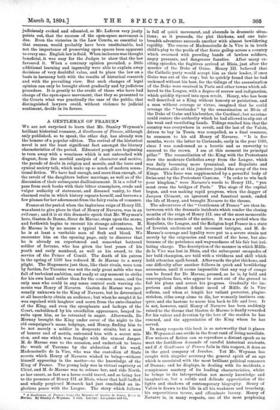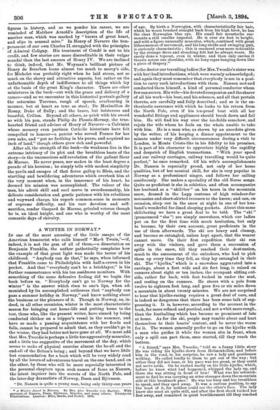A GENTLEMAN OF FRANCE.*
WE are not surprised to learn that Mr. Stanley Weyman's brilliant historical romance, A Gentleman of France, although only published, so to speak, the other day, has already won the honour of a popular edition. The revival of the historical novel is not the least significant fact amongst the literary characteristics of the period. Educated people are beginning to turn away with a. weariness which is not untouched with disgust, from the morbid analysis of character and motive, the parade of doubt in religion and morals, and the loose and cynical society talk, which make up so much of modern sensa- tional fiction. We have had enough, and more than enough, of the revolt of the daughters before marriage, as well as of the discussion of their subsequent disillusionment. It is a relief to pass from such books with their bitter atmosphere, crude and vulgar audacity of statement, and diseased vanity, to that charmed realm in which history repeats herself, and borrows a few plumes for her adornment from the fairy realm of romance.
France at the period when the inglorious reign of Henry III. was about to give place to that of Henry of Navarre, was in an evil case ; and it is at this dramatic epoch that Mr. Wey man's hero, Gaston de Bonne, Sieur de Marsac, steps upon the scene, and forthwith begins to recount his strange adventures. M. de Marsac is by no means a typical hero of romance, but he is at least a veritable man of flesh and blood. We encounter him on the opening page, only to discover that he is already an experienced and somewhat battered soldier of fortune, who has given the best years of his youth and early manhood, as well as his sword, to the service of the Prince of Conde. The death of his patron in the spring of 1588 has reduced M. de Marne to a sorry plight. The Huguenots just then, like their rivals, were torn by faction, for Turenne was not the only great noble who was full of turbulent ambition, and ready at any moment to strike for his own hand rather than for the common cause, and the only man who could in any sense control such warring ele- ments was Henry of Navarre. Gaston de Manse was per- sonally unknown to the King of Navarre, but he determined at all hazards to obtain an audience; but when he sought it he was repulsed with laughter and scorn from the ante-chamber of the King, and even the sycophants and lackeys of the Court, emboldened by his crestfallen appearance, heaped in- sults upon him, as he retreated in anger. Afterwards, De Mornay brought the King under cover of the night to the old campaigner's mean lodgings, and Henry, finding him to be not merely a soldier in desperate straits, but a man of honour and of mettle, entrusted him with a secret mis- sion, and one which was fraught with the utmost danger. M. de Marsac rose to the occasion, and undertook to brave the wrath of Turenne by the abduction of his ward, Mademoiselle de la Vire, who was the custodian of State secrets which Henry of Navarre wished to bring—without himself appearing in the matter—to the knowledge of the King of France. The young lady was in virtual captivity at Ohize, and M. de Marsac was to release her, and ride North, as her escort, as fast as a horse could travel, and so bring her to the presence of Henry III. at Blois, where that half-baffled and wholly perplexed Monarch had just concluded an in- glorious peace with the League. The story which follows
• 4 Gentleman of France: being the Memoirs of Gaston de Bonne, Sieur de Marsac. By Stanley J. Weyman. 3 vols. Lordon : Lot gmans and Co.
is full of quick movement, and abounds in dramatic situa- tions; as it proceeds, the plot thickens, and one hair- breadth adventure succeeds another with almost bewildering rapidity. The rescue of Mademoiselle de la Vire is in truth child's-play to the perils of that fierce gallop across a country which swarmed with prowling bands of lawless soldiers, angry peasants, and dangerous fanatics. After many ex- citing episodes, the fugitives arrived at Blois, just after the murder of the Duke of Guise. Henry III. believed that the Catholic party would accept him as their leader, if once Guise was out of the way ; but he quickly found that he had reckoned without his host, for the tidings of the assassination of the Duke were received in Paris and other towns which ad- hered to the League, with a degree of sorrow and indignation, which quickly ripened into open revolt. Henry, who has been well described as a King without honesty or patriotism, and a man without courage or virtue, imagined that he could revenge the " barricades " by the assassination at Blois of the Duke of Guise and his brother, the Cardinal ; but no crime could restore the authority which he had allowed to slip out of his weak and vaccilating hands. Tidings reached him that the country was everywhere in revolt, and the last of the Valois, driven to bay in Tours, was compelled, as a final resource, to summon to his aid Henry of Navarre. "It is five months, wrote the latter to Corisande, early in the year 1589, since I was condemned as a heretic and as unworthy to succeed to the crown. I am at this moment its principal pillar." The reconciliation of the King with the Protestants drew the moderate Catholics away from the League, which was daily becoming more tyrannical, and Royalists and Protestants alike at this juncture joined the army of the two Kings. This force was supplemented by a powerful body of Swiss sent by the Protestant Cantons. "In order to win back your kingdom," were Navarre's words to Henry III., "you must cross the bridges of Paris." The siege of the capital began, and was making rapid progress, when the dagger of Jacques Clement, an ignorant and fanatical monk, ended the life of Henry, and brought Navarre to the throne.
The adventures of the "Gentleman of France" are thus in- terwoven with the dramatic incidents which render the closing months of the reign of Henry III. one of the most memorable periods in the annals of the nation. It was a period when the Royalists, the League, and the Religion kept France in a state of feverish excitement and incessant intrigue, and M. de Marsae's courage and loyality were put to a severe strain not merely by the exigencies and turmoil of the hour, but also because of the petulance and waywardness of his fair but irri- tating charge. The description of the manner in which Mdlle. de la Vire was lost in Blois, and the subsequent escapades of her bold champion, are told with a vividness and skill which, hold attention spell-bound. Afterwards the plot thickens, and one difficulty after another follows in quick and bewildering succession, until it seems impossible that any way of escape can be found for De Manse, pressed, as he is, by bold and unscrupulous foes, who appear to start out of the ground to foil his plans and arrest his progress. Gradually the im- perious and almost defiant mood of Mdlle. de la Vire softens, and when at length her valiant protector, plague- stricken, rides away alone to die, her womanly instincts con- quer, and she hastens to nurse him back to life and love. It is not, however, until Henry of Navarre has been suddenly raised to the throne that Gaston de Marsac is finally rewarded for his valour and devotion by the love of the maiden he has rescued, and the appreciation of the King whom he has served.
In many respects this book is so noteworthy that it places Mr. Weyman at one stride in the front rank of living novelists. Few writers of fiction can so reproduce a distant epoch as to meet the fastidious demands of careful historical students, and if A Gentleman of France fails in this respect, it does so in the good company of Ivanhoe. Yet Mr. Weyman has caught with singular accuracy the general spirit of an age
which is associated with the most brilliant political romances of Dumas; and he displays, in dealing with its incidents, a conspicuous mastery of its leading characteristics, whiliat he brings to its interpretation not merely knowledge and imagination, but a subtle and delicate appreciation of the lights and shadows of contemporary biography. Henry of Valois is drawn to the life in all his weakness and treachery, his superstitions terror, and effeminate luxury. Henry of Navarre is, in many respects, one of the most perplexing
figures in history, and as we ponder his career, we are reminded of Matthew Arnold's description of the life of another man, which was marked by "bursts of great heart, and slips in sensual mire." In Henry of Navarre the tem- perament of our own Charles II. struggled with the principles of Admiral Coligny. His treatment of Conc14 is not to his credit, and few stories are more discreditable in their vulgar scandal than the last amours of Henry IV. We are inclined to think, indeed, that Mr. Weyman's brilliant picture of Henry de Bourbon leans almost too much to mercy's side, for Michelet was probably right when he laid stress, not so much on the showy and attractive aspects, but rather on the unfathomable depth of indifference to all things which lay at the basis of the great King's character. There are other miniatures in the book—cut with the grace and delicacy of a cameo—and so we encounter in this historical portrait-gallery the saturnine Turenne, rough of speech, overbearing in manner, but at heart as true as steel; De Maximilian de Rosny, Duke of Sully; and the brave, but boisterous and boastful, Crillon. Beyond all others, as quick with his sword as with his pen, stands Philip du. Plessis-Mornay, the true. hearted friend and adviser of Henry of Navarre—a Calvinist whose memory even partisan Catholic historians have felt compelled to honour—a patriot who served France for her own sake, and "put no farthing in his purse, and acquired no inch of land," though others grew rich and powerful.
After all, the strength of the book—its weakness lies in the extreme intricacy of its plot and the breathless haste of the story—is the unconscious self-revelation of the gallant Sieur de Marsac. He never poses, nor makes in the least degree a parade of his heroism ; be simply tells with modest simplicity the perils and escapes of that fierce gallop to Blois, and the startling and bewildering adventures which overtook him at the very moment when, in the innocence of his heart, he deemed his mission was accomplished. The valour of the man, his adroit skill and cool nerve in swordsmanship, his delicate consideration and gentle patience with his rebellious and wayward charge, his superb common-sense in moments of supreme difficulty, and his rare devotion and self- sacrifice, render Gaspard de Marsac, grizzled veteran though he is, an ideal knight, and one who is worthy of the most romantic days of chivalry.







































 Previous page
Previous page